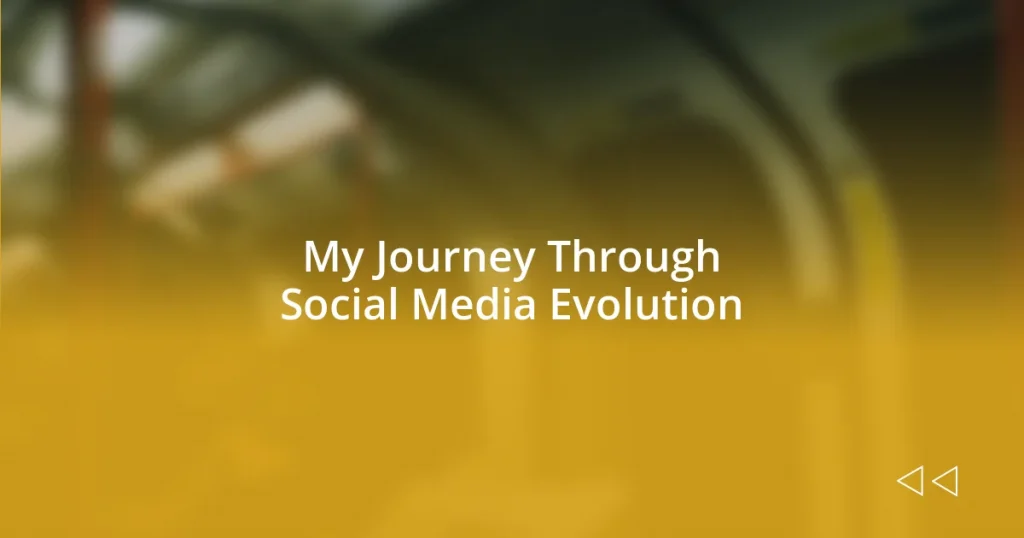Key takeaways:
- Technology, through fitness apps and wearable devices, significantly enhances personal health management and access to care, promoting a proactive approach to wellness.
- The shift towards personalized health solutions, like customized fitness plans and nutrigenomics, empowers individuals to make informed health choices tailored to their unique needs.
- Mental health awareness initiatives foster supportive communities, emphasizing the importance of open discussions and resources for navigating psychological challenges.
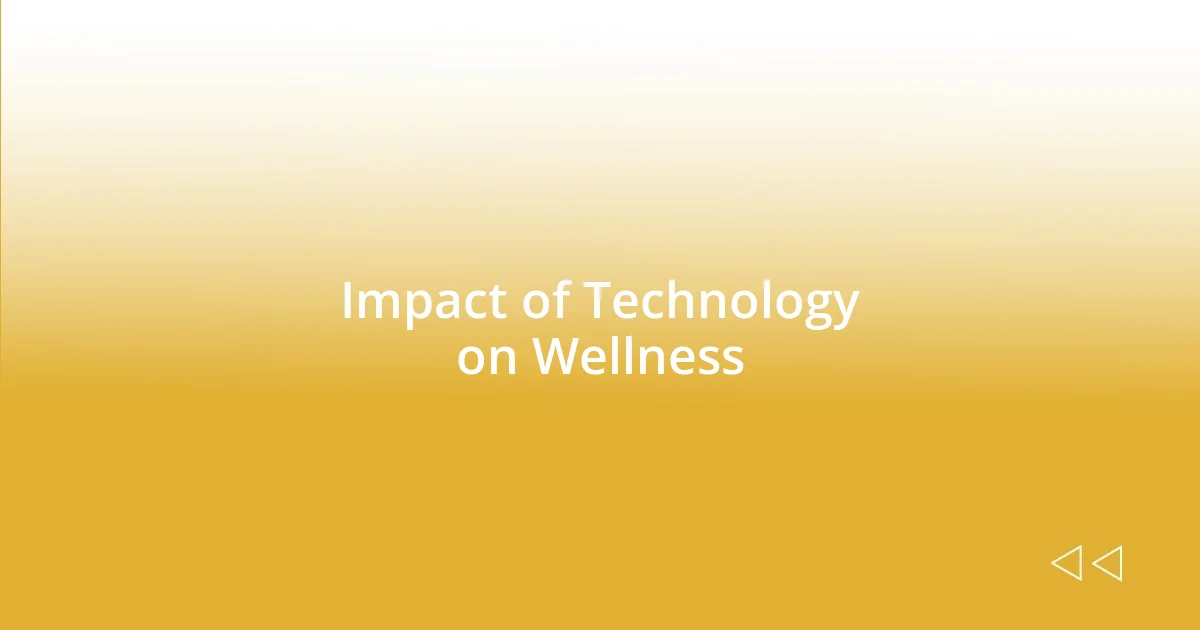
Impact of Technology on Wellness
Technology has profoundly transformed the wellness landscape. I remember the first time I tried a fitness app; it felt like having a personal trainer right in my pocket. It was empowering to track my progress daily—it made my goals feel more attainable and immediate.
Wearable devices, like fitness trackers, have also changed the way we approach our health. They provide real-time data, which not only motivates but also offers deeper insights into our bodies. Have you ever wondered how much a good night’s sleep affects your mood the next day? I’ve found that sleep tracking, for instance, can prompt you to alter your bedtime routine, leading to improved energy levels and overall well-being.
Moreover, telehealth has revolutionized access to care, especially for those in remote areas. I’ve personally experienced the convenience of a virtual consultation when feeling under the weather—it was almost too easy. Is it possible that technology is bridging the gap between us and the healthcare we deserve? From my perspective, it certainly seems that way, fostering a proactive mindset about health management.
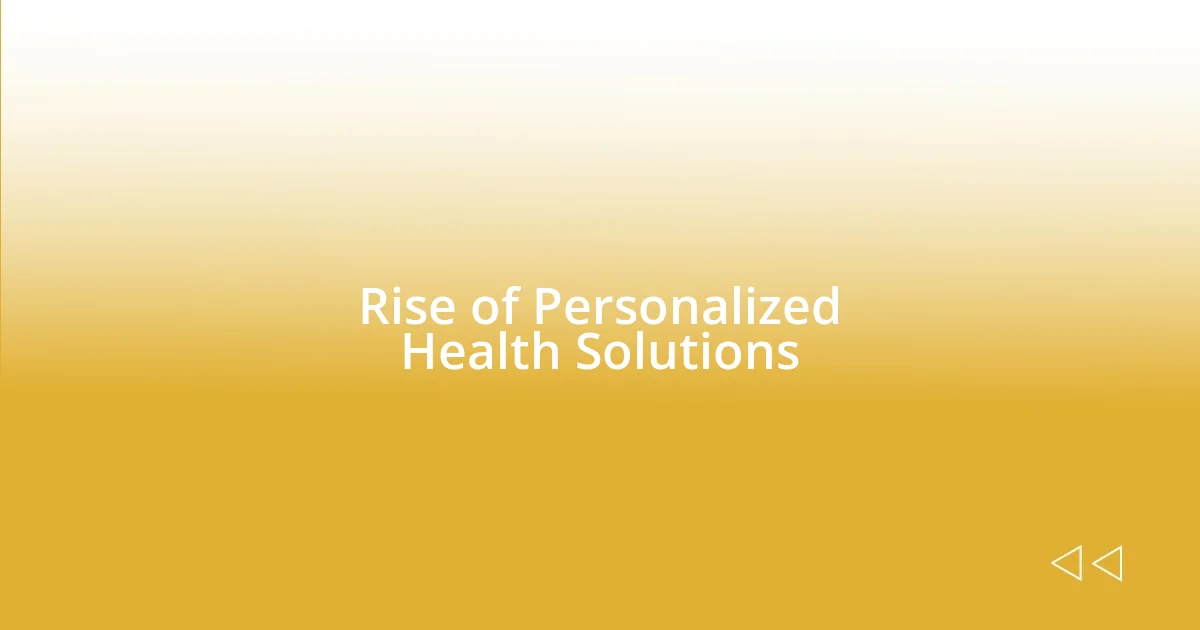
Rise of Personalized Health Solutions
There’s no denying that the rise of personalized health solutions is reshaping our wellness journeys. The recent trend towards customization reflects a deeper understanding of individual needs, moving away from the one-size-fits-all approach. I recall when my friend received a DNA test for health insights; the results tailored dietary suggestions that significantly changed her eating habits. It was fascinating to see how data could inform better health choices, making her feel empowered about her nutrition.
Personalized health solutions encompass a range of offerings that cater to unique requirements. Here are some notable examples I’ve observed:
- Customized fitness plans: Apps that adapt workouts based on progress and preferences.
- Nutrigenomics: Tailored dietary advice based on genetic data.
- Mental health apps: Programs offering personalized coping strategies based on individual stress levels and triggers.
- Telemedicine: Services connecting you with healthcare professionals suited to your specific needs.
- Wearables: Devices that generate personalized insights regarding activity and health metrics.
By embracing these innovations, I believe we can create a more engaged and informed approach to our wellness. It’s remarkable how technology is paving the way for a future where our health solutions genuinely fit the unique tapestry of our lives.
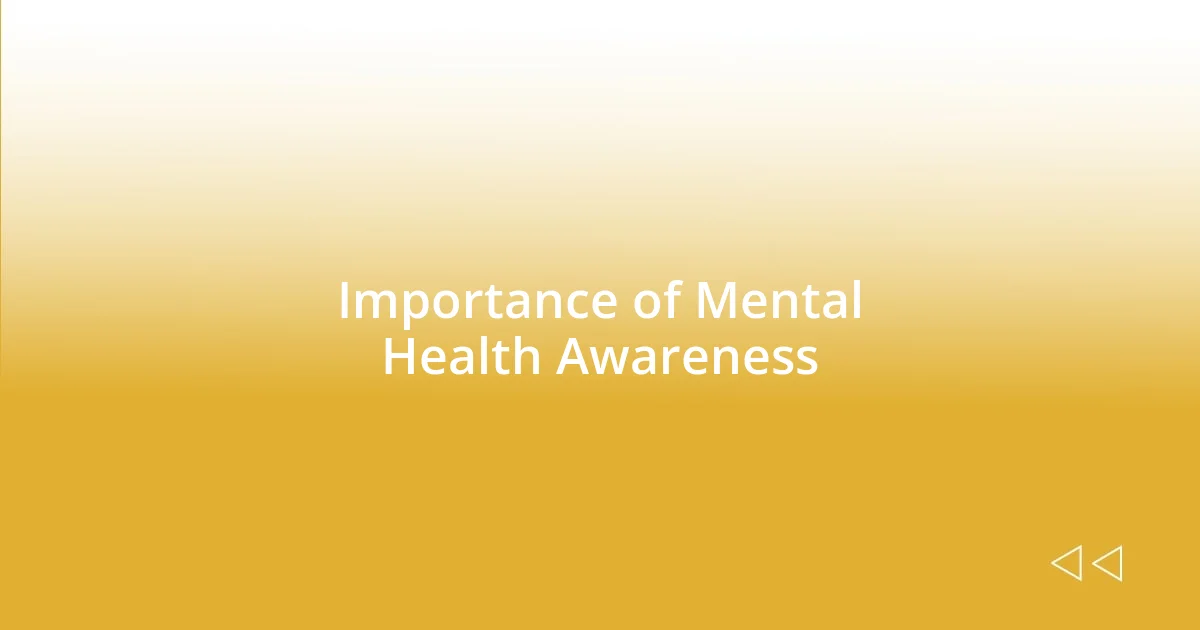
Importance of Mental Health Awareness
Mental health awareness is more crucial than ever, as it fosters a deeper understanding of our psychological well-being. I’ve witnessed firsthand how discussing mental health openly can dissolve stigmas and create supportive environments. For instance, when a colleague shared their struggles with anxiety in a team meeting, it not only normalized the conversation but also encouraged others to share their experiences, leading to a more compassionate workplace.
In my experience, awareness initiatives can lead to significant improvements in community support systems. I remember attending a mental health workshop where participants engaged in activities to better understand emotional resilience. It emphasized that everyone faces mental health challenges at some point, and having resources readily available can make all the difference. Isn’t it empowering to think that simply recognizing these challenges can pave the way for more informed conversations and support strategies?
Furthermore, mental health awareness impacts not only individuals but also entire organizations and communities. The ripple effect of understanding mental health can be profound. I often reflect on how promoting mental health awareness in schools can equip young people with the tools they need to navigate life’s pressures. Initiatives like peer support programs could essentially transform how we approach mental well-being from a young age.
| Mental Health Awareness | Benefits |
|---|---|
| Increased Understanding | Blurs the stigma surrounding mental health issues. |
| Community Support | Develops resources that foster connection and healing. |
| Educational Initiatives | Equips future generations with important coping skills. |
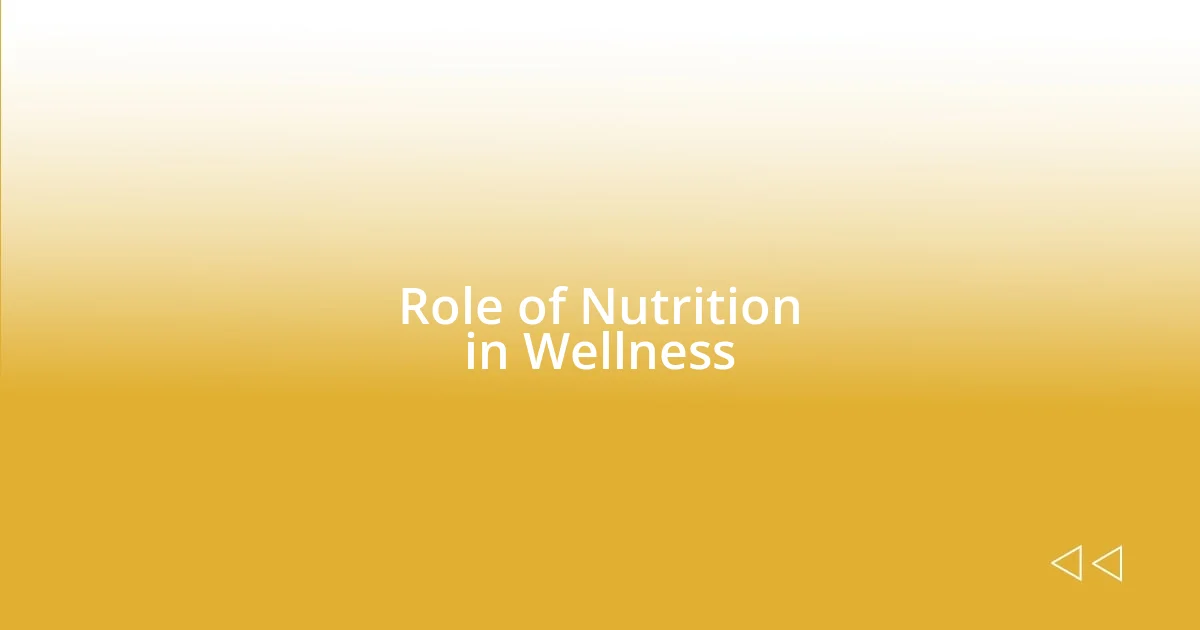
Role of Nutrition in Wellness
Nutrition plays a vital role in our overall wellness, influencing not just physical health but also mental clarity and emotional stability. I remember when I switched to a whole-foods diet—those initial weeks were challenging, but the increase in my energy levels was nothing short of transformative. Isn’t it interesting how the right foods can uplift our moods and enhance our focus?
I’ve noticed that nutrition is often overlooked in discussions about holistic health. For instance, I used to underestimate the impact of meals on my stress levels, but after experimenting with meal prepping, I found that having balanced, nutritious options readily available helped me stay calm during hectic days. It’s a simple change, yet the benefits are profound! Have you ever considered how your nutrition affects your daily mood?
Moreover, as I delve deeper into the wellness community, I see a growing emphasis on plant-based diets and their benefits for overall health. My own experience with incorporating more fruits and vegetables has opened my eyes to a world of flavors and health benefits I hadn’t explored before. Wouldn’t it be amazing if more people embraced this shift in perspective on nutrition? The connection between what we eat and how we feel is undeniable, and it’s a conversation worth having.

Sustainable Practices in Health Industry
Sustainable practices in the health industry are gaining significant traction, reflecting a growing awareness of our environmental impact. I remember attending a conference where a speaker passionately detailed how hospitals are switching to renewable energy sources. It struck me how making such transitions not only reduces carbon footprints but also promotes a healthier environment for patients and staff alike. Isn’t it inspiring to think that our health care facilities can lead by example?
In my experience, the push for sustainability often intersects beautifully with innovation. A favorite memory of mine was experimenting with a local organic health food startup that focused on eco-friendly packaging. When they shared their journey of sourcing ingredients sustainably, I felt a strong connection to their mission. It made me realize how everyday choices in health-oriented businesses could directly influence our planet’s health, encouraging individuals to adopt a greener lifestyle.
The integration of telehealth services has also emerged as a sustainable practice within the health industry. I’ve seen how this approach minimizes energy consumption and resource waste from commuting. When my friend had a chance to consult with a specialist from home, it not only saved her time but also reduced the environmental burden of travel. Isn’t it fascinating how technology can enhance our health while also being kinder to our world? This alignment of health and sustainability opens up a plethora of possibilities for a more holistic approach to wellness.
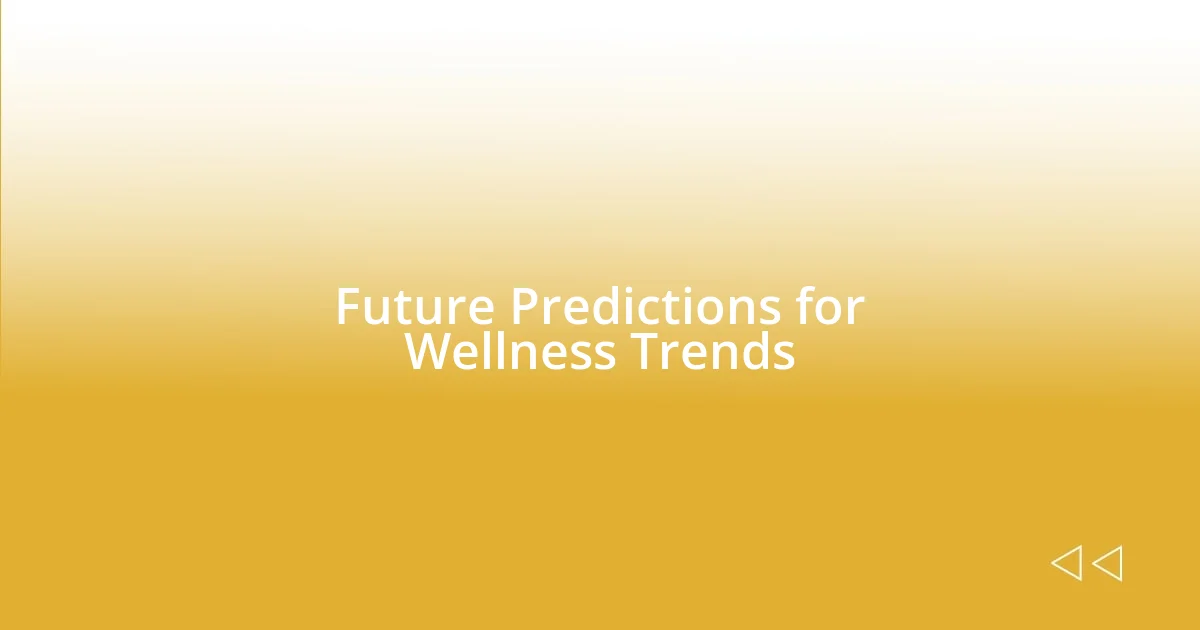
Future Predictions for Wellness Trends
I see wellness trends evolving towards a more personalized and technology-driven approach. Recently, I tried an app that used my health data to tailor nutrition suggestions specifically for my lifestyle. The experience was eye-opening; it felt like having a personal health coach at my fingertips! Isn’t it incredible how technology can empower us to make more informed choices about our well-being?
In my journey, I’ve also noticed a growing interest in mental wellness practices, such as mindfulness and meditation. Just the other day, I joined a virtual group meditation session, and I was struck by the sense of community it fostered, despite being miles apart. How often do we take moments to pause and reconnect with ourselves amidst our busy lives? I believe this trend will continue to flourish, as people seek ways to navigate the complexities of modern existence.
Furthermore, I can’t help but think that the fusion of fitness with gamification will reshape how we view physical activity. Reflecting on my own experience with fitness apps that turn workouts into games, I find them incredibly motivating. It transforms a routine workout into a fun challenge! Could this be the key to encouraging more people to adopt healthier habits? As the lines between fitness and entertainment blur, the potential for creative engagement in wellness seems boundless.











